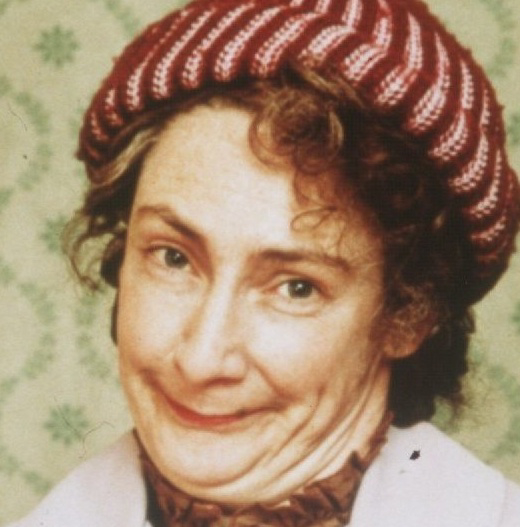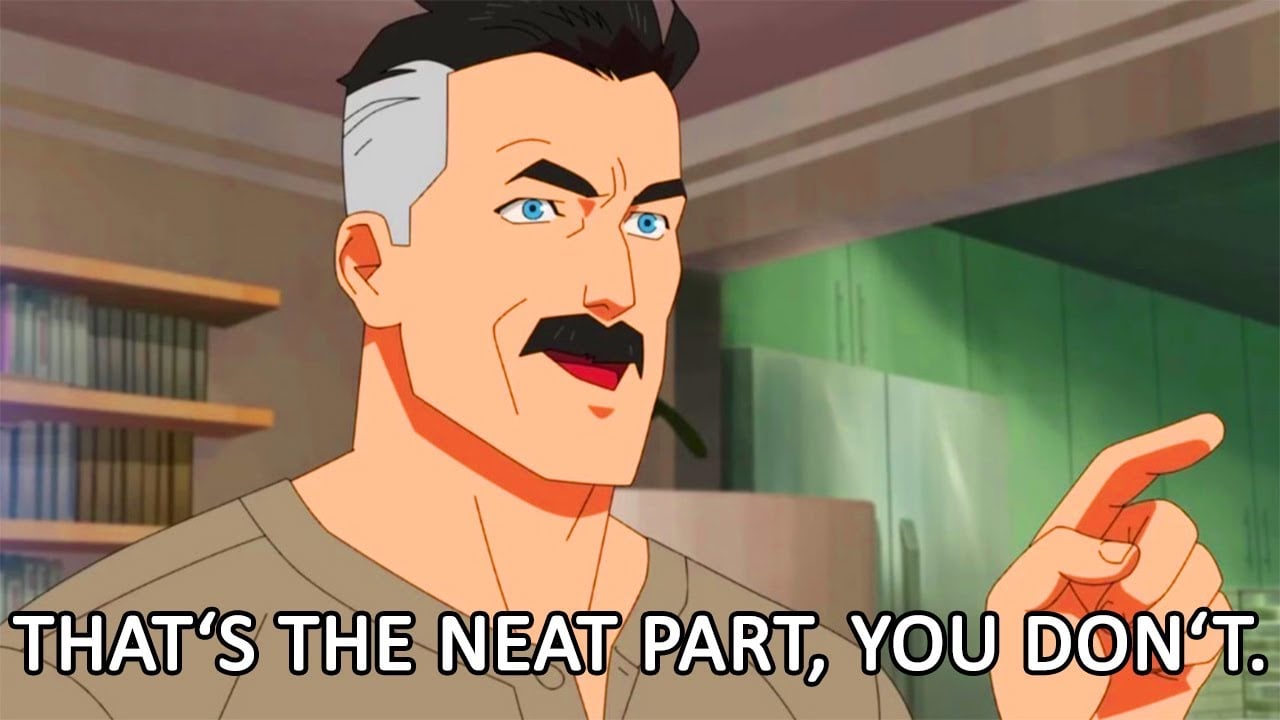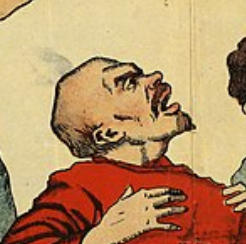If only they could be more like Chuck Feeney.
In February 2011, Feeney became a signatory to The Giving Pledge. In his letter to Bill Gates and Warren Buffett, the founders of The Giving Pledge, Feeney wrote, “I cannot think of a more personally rewarding and appropriate use of wealth than to give while one is living—to personally devote oneself to meaningful efforts to improve the human condition. More importantly, today’s needs are so great and varied that intelligent philanthropic support and positive interventions can have greater value and impact today than if they are delayed when the needs are greater.” He gave away a final $7 million in late 2016, to the same recipient of his first charitable donations, Cornell University. Over the course of his life, he gave away more than $8 billion.
"Hahaha what a nerd. "
– Gates & Buffet, from Epstein Island, probably
Contradiction in terms
We’d have the flying cars we were fucking promised by the movies we grew up with.
Paradoxical question, if they truly helped they would never be billionaires.
Deep beneath a private island in the Pacific, in a hidden chamber lined with gold-leafed bookshelves and quantum supercomputers, the most powerful men on Earth gathered in secret.
Donald Trump adjusted his crimson tie and sighed. “It’s not working, folks. We tried giving them money, and they just keep asking for less.”
Mark Zuckerberg, seated beside him, nodded solemnly. “I even launched an algorithm that boosted posts about universal basic income. What happened? People demanded more gig work instead.”
Elon Musk leaned forward, rubbing his temples. “I offered to give away Tesla stock. Instead, they asked me to cut costs and fire more workers to ‘boost productivity.’ How do you give away wealth when they refuse to take it?”
Jeff Bezos, pacing the marble floor, gestured wildly. “I raised warehouse wages! They organized a petition to lower them, saying it would ‘teach discipline.’”
Peter Thiel adjusted his monocle. No one knew why he wore one, but it added to his aura of sinister brilliance. “We tried funneling money through offshore charities. We even funded a secret movement that encouraged people to demand better living conditions. What happened? They begged for longer hours, fewer benefits, and harsher bosses.”
Larry Ellison sipped a 200-year-old scotch and sighed. “We’re trapped. Every time we try to redistribute our wealth, the system forces it back into our hands.”
A hush fell over the chamber.
The room’s quantum supercomputer beeped. A projection lit up the wall, showing an economic simulation. Every time they injected money into the lower classes, the populace—driven by an inexplicable work ethic—found ways to give it back. They called for “hard work” over “handouts,” praised billionaires as job creators, and tirelessly pursued policies that kept wages low and corporate profits high.
Trump shook his head. “I thought people loved winning. This is the worst deal in history.”
Musk sighed. “Maybe we should leave Earth entirely. Let them sort it out.”
Bezos frowned. “Mars colonization isn’t ready yet.”
Zuckerberg scrolled through his phone, a flicker of hope in his eyes. “What if we just… stopped trying?”
The billionaires exchanged glances.
Thiel steepled his fingers. “That would mean living with the guilt.”
Ellison drained his glass. “Or we could take the nuclear option.”
The room fell silent.
“The nuclear option?” Bezos asked cautiously.
Ellison leaned in, his voice barely above a whisper. “We… give them everything.”
Gasps filled the chamber.
“No stocks. No corporations. No assets. No wealth,” Ellison continued. “We drop it all into their laps and walk away. No strings attached. No economic structures left to maintain. Just pure, uncontrolled prosperity.”
Musk paled. “That’s madness. A complete system collapse.”
Trump grumbled. “But maybe… the greatest system collapse.”
The quantum supercomputer calculated. The answer flashed on the screen:
Projected Outcome: Billionaires’ wealth depleted. Poverty instantly eradicated. Within five years, 98% of former billionaires regain their fortunes due to economic demand for ‘strong leadership’ and ‘wealth redistribution toward the competent.’
Zuckerberg groaned. “Even if we burn it all down, they’ll just build it back up around us.”
Bezos sat heavily in his chair. “Then there’s only one solution.”
The others leaned in.
“We keep trying.”
Silence.
Then, one by one, the billionaires nodded.
It was their curse. Their eternal struggle. No matter how hard they tried to give it all away, the world would always find a way to make them rich again.
And so, reluctantly, they raised their glasses.
“To ending poverty,” Musk muttered.
“To losing,” Trump added.
They drank in grim silence, knowing that, once again, they were doomed to win.
Great story :')
Thank you!
More like China?
War. Literally war. And not about the money, but about who has the most power.
The world would be better if there were no billionaires. That would be a huge help. Nobody should be allowed to amass that much wealth. And a financial system set up to prevent such a thing would ideally also offer more of a level playing field as far as individual wealth goes.
“Billionaires” (multi-millionaires in the late 18- early 1900’s) did help back in the day - they built libraries, schools, hospitals, orphanages, etc… but they were still absolute bastards that were anti-labor, killed people to avoid paying them more or giving them a decent work week, imported, abused, and discarded labor, among many other rich-barely-controlled-asshole things they did.
If billionaire actually helped people it would be pretty much like government spending tax money.
Could’ve be much more efficient by just taxing the billionaires right away.
Yes, it would look a lot more like the 50s when tax was highest on the wealthy
Like Elon Musk cutting government services to save the US taxpayer money.
…is what some weirdos I know seem to genuinely believe
You wouldn’t see any billionaires.
I don’t think I’ve ever seen a billionaire IRL.
they don’t mingle with the dirty poors
Me neither. I have only personally known Millionaires. Both multimillionaires that I know fly totally under the radar by being completely humble, non flashy people.
If we’re counting property values, millionaires are a dime a dozen in some areas.
No I was counting as non property wealth, but as multimillionaire of world wide company. To meet the guy on the steet in a 90s Honda, you would never guess his wealth.
The 600 series had rubber skin. We spotted them easy.
The do this on purpose. Chelsea Fagan from The Financial Diet had a great video about this
Generally, everything would just be plain better as their dragon hoards are actually spent, and they dont hoard GDP from the rest of us. But you’d probably see a public service boom wherever they invested, and you’d likely see a lot less people struggling with anything from bills to food to even entertainment.
Its not a dragon hoard, its the perceived value of their companies.
That is a big factor, but they also have regular assets and personal imvestments
How am I supposed to enjoy that?
This is an interesting conundrum, actually. The big question at its core being:
Can you ever do enough good through philanthropy, so that it offsets the damage you had to do, in order to become a billionaire? Can even all the billionaires in the world do enough good with their money, to offset the damage done by a system, that allowed for them to become billionaires?
I, personally, don’t think it is possible.
To give an actual answer: I think, the world would definitely be better, but unless those billionaires collectively used all the power their money provides, to do away with money and the possibility of billionaires altogether, I don’t think it would amount to all that much.
I read a good post about this before, the summary was: a philanthropist billionaire helps causes specific to their discretion. While their rise to wealth has taken the toll from many victims, some dead directly because of it, their donations back may not even help the location they robbed it from.
You can picture United Health suddenly helping world hunger, it doesn’t bring back all the people who died miserably from denied claims, or those who are still alive but became permanently disabled by lack of care.

See also, 📺 Gino D’Acampo.
It’s a fair point but that’s such a smug way to say it












